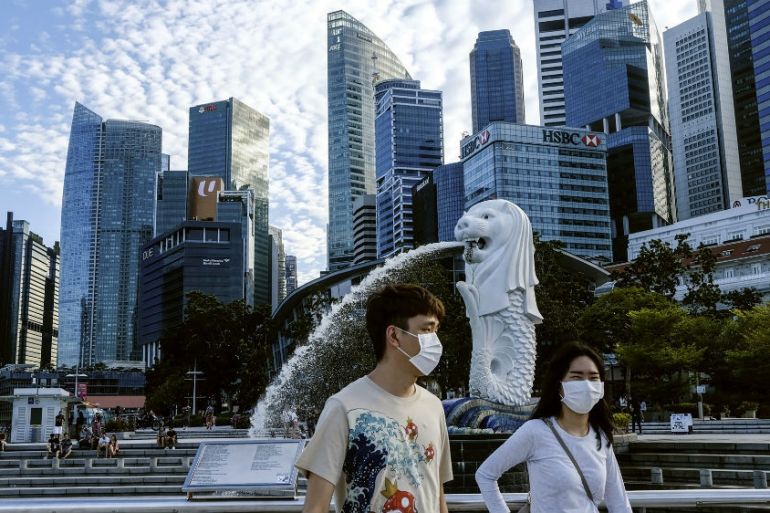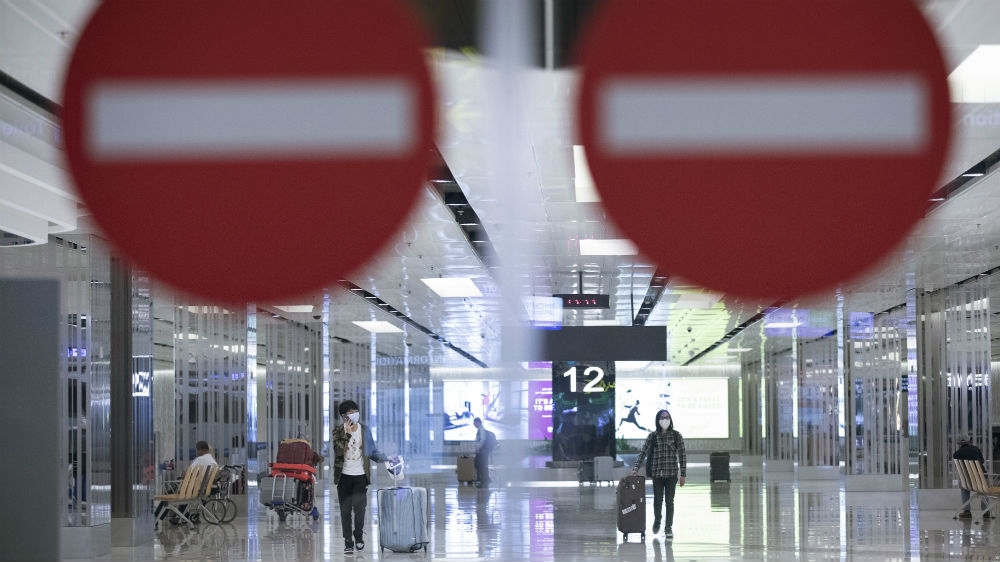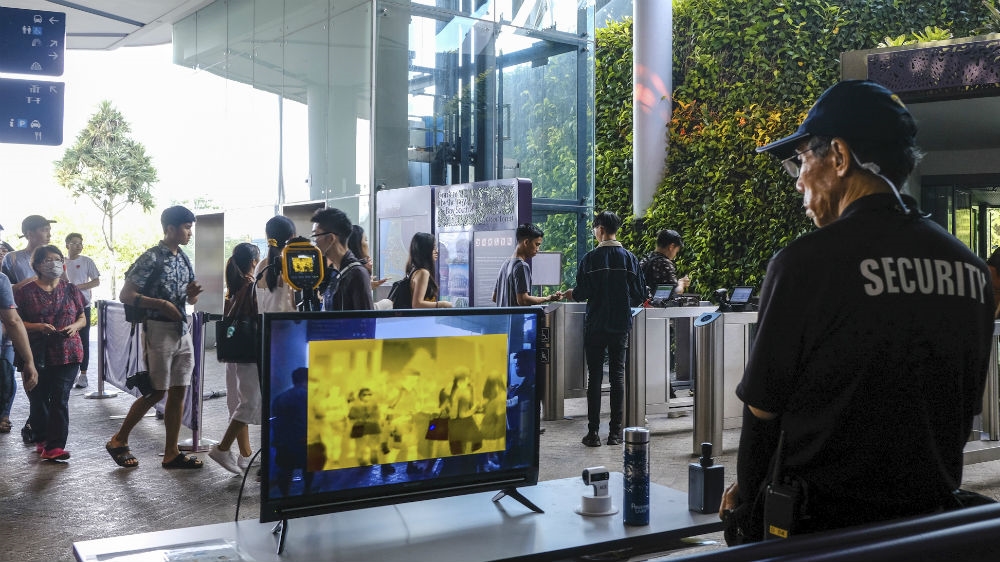Singapore closes borders to keep virus at bay, but no shutdown
The move follows the island-nation’s first two coronavirus-related deaths and a surge in cases from overseas.

Singapore – A day after Singapore confirmed its first two coronavirus-related deaths, the country said it would close its borders to short-term visitors and some foreign labourers from 11:59pm (15:59 GMT) on Monday to help the limit the spread of the disease.
The new rules mean short-term visitors will no longer be allowed to enter or transit through Singapore, while semi-skilled workers on “work passes” will not be allowed to return to the island unless their job is in sectors that provide essential services such as healthcare and transport, the Ministry of Health (MOH) said in a statement.
Keep reading
list of 3 itemsCoronavirus: Which countries have confirmed cases?
What happens if you catch the new coronavirus?
National Development Minister Lawrence Wong told a briefing on Sunday the measures to “significantly tighten” Singapore’s borders had been prompted by the escalation of the COVID-19 pandemic around the world.
“In Singapore, almost 80 percent of our new COVID-19 cases over the past three days were imported, most of them Singapore residents and Long Term Pass holders returning home from abroad. These imported cases had travel histories to 22 different countries”, the MOH statement said.
Widely praised for its aggressive efforts to contain the virus without resorting to a total lockdown of the city, Singapore reported the country’s first deaths from the disease on Saturday.

The first was a 75-year-old Singaporean woman with a history of chronic heart disease and hypertension who had been in intensive care for 26 days since being admitted with pneumonia.
The other was a 64-year-old Indonesian man who was admitted to ICU on March 13, the day he arrived in Singapore from Indonesia and was confirmed to have COVID-19. Before he arrived in Singapore, he had been hospitalised in Indonesia for pneumonia and had a history of heart disease.
“I know Singaporeans will be worried and anxious. We must take courage and not give in to our fears”, Health Minister Gan Kim Yong told reporters on Saturday.
Gradual tightening
A day before the deaths, Singapore announced it would expand social distancing measures to make it more difficult for the virus to spread. All events and gatherings involving 250 or more people are banned until June 30, and the suspension of social activities for older people by government agencies will be continued until April 7.
In addition, retailers and food and beverage operators have been told to create more space between customers in their outlets – by marking the floor to show people where to queue and limiting the number of people allowed inside at any one time.
Singapore: controlled shopping and social distancing ✔️ pic.twitter.com/rpSyZvsCMw
— Mark Thomas (@MarkThomasNZ) March 21, 2020
“We must all take the necessary precautions to keep ourselves and our families safe”, Gan said. “We must stay united, work together, support one another, look out for each other. This way, by staying together, we will be able to prevail and overcome the COVID-19 infection.”
In a Facebook post after the two deaths were announced, Prime Minister Lee Hsien Loong also urged all the island’s residents to work together against the virus.
“As we get more COVID-19 cases, more patients will need ICU care, and we must brace ourselves for more losses”, he said.
“The government is doing all we can to slow the spread of the virus, but everyone needs to support and comply with the measures we have put in place. We must work together to keep ourselves, our families, and Singapore safe.”
Analysts say the border closing is a justifiable precaution.
“Given Singapore is a small city-state, completely linked to the outside world, closing our borders is a hard but necessary decision to take. We can’t afford our healthcare system to be overwhelmed by imported cases when we need it to take care of local residents”, Hasan Jafri, a Singapore-based political risk analyst, told Al Jazeera.
In January, Singapore recorded the highest numbers of coronavirus infections outside China, and its health and government officials wasted no time in responding.
Test, treat, track
It has tested, treated, and tracked, with the help of the police, each case – numbering 432 as of Sunday – while issuing strict directives such as limits on large public gatherings, and 14-day stay-home notices to all returning from overseas.
Despite the newly announced border closures, Singapore has stopped short of some of the more severe control measures now being taken in other countries.
There is no full-scale lockdown. Schools and pre-schools are scheduled to reopen after a one week holiday with stricter measures in place to limit activities and keep students apart, including assigned seating at lunch.
Restaurants, bars, theatres and other businesses remain open but are expected to follow the stricter social distancing guidelines. Working from home is encouraged, but there are no stay-home orders for non-essential employees.
Lockdown orders – requiring residents to stay at home – have been issued in countries across the world from China to Italy to the United States.
The World Health Organization (WHO) chief Tedros Adhanom Ghebreyesus has praised Singapore’s “all-government approach” to the containment of COVID-19, from hospital preparedness to public awareness campaigns.
Singapore’s closest neighbour, Malaysia, recently announced a two-week national lockdown, closing its borders and shutting down schools and business, which prompted students and family members with obligations on both sides to scramble across the border crossing, while employers in Singapore sought temporary lodging for workers.

So far, Singapore has been able to avoid that route.
For starters, Singapore’s quick response may have averted the need for a lockdown.
“The government’s early recognition that COVID-19 could become a global pandemic well before it had, and to provide early notice and instruction on business continuity plans, enabled society here to put into action steps which will minimise the disruption and costs of a lockdown”, Steven Okun of consulting firm McLarty Associates told Al Jazeera.
‘Nuclear option’
In addition, analysts caution that a full-fledged lockdown on one of the world’s most trade-dependent economies would not only shut down daily life, with negative psychological impacts on public morale and confidence, it would do major damage to business.
“A lockdown is the ‘nuclear option’ which Singapore will resist so long as it is not needed. Even if used, we don’t have the luxury of an extended lockdown,” Eugene Tan, an associate professor of law at Singapore Management University, told Al Jazeera. “It would mean that Singapore has to be prepared for a severe short-term fallout, particularly to the economy, which would then be under stress.”
It is an option the government has not ruled out, National Development Minister Lawrence Wong said last week.
“We have always said that we need to consider a whole range of measures and not rule anything out,” he told a news conference at the Ministry of Communications and Information. “It is certainly a very extreme measure, and we don’t think we need to get there if we do all the things we have been doing, we have been advocating, and we do them well.”
The enhanced social distancing measures are designed to keep customers farther apart at restaurants, hotels, supermarkets, nightclubs, and cinemas.
Foreign domestic workers – who do the cooking and cleaning in many Singaporean households – have been advised to remain at their employer’s home even on their single day off, and avoid the shopping plazas where many typically congregate.
Meanwhile, Singapore has also shown it is prepared to get tough with those who flout the rules in order to ensure compliance.
The Ministry of Manpower on Saturday revoked the work passes of 89 people arriving from COVID-19-affected countries who breached entry approval or stay-home notice requirements.
The Ministry of Health (MOH) has also advised hospitals and private specialist clinics not to accept new patients who do not reside in Singapore.
While Singapore’s advanced healthcare system has long attracted medical tourists from neighbouring countries, the move is seen as an attempt to conserve limited healthcare resources for domestic COVID-19 cases.
Follow Tom Benner on Twitter @tgbenner.